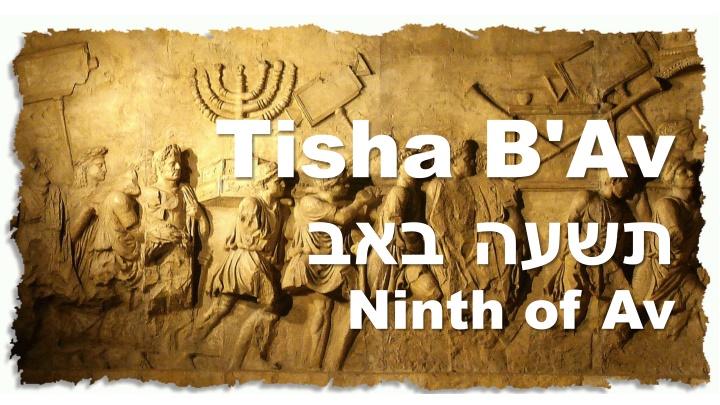
Tisha B'Av - Day of Mourning and Historical Tragedies
Tisha B'Av, known as the Day of Mourning, commemorates the destruction of the ancient Temples and major calamities in Jewish history. From the twelve spies to the destruction of the First and Second Temples, as well as events like the Bar Kokhba revolt, this day holds significant sorrow. The expulsion of Jews from diverse regions in different eras also marked this solemn occasion. Over time, Tisha B'Av has evolved as a day of remembrance for various Jewish tragedies, including the First Crusade.
Download Presentation

Please find below an Image/Link to download the presentation.
The content on the website is provided AS IS for your information and personal use only. It may not be sold, licensed, or shared on other websites without obtaining consent from the author. If you encounter any issues during the download, it is possible that the publisher has removed the file from their server.
You are allowed to download the files provided on this website for personal or commercial use, subject to the condition that they are used lawfully. All files are the property of their respective owners.
The content on the website is provided AS IS for your information and personal use only. It may not be sold, licensed, or shared on other websites without obtaining consent from the author.
E N D
Presentation Transcript
Tisha B'Av Ninth of Av
A Day of Mourning for the destruction of the ancient Temples and Jerusalem, and other major calamities which have befallen the Jewish people.
The twelve spies sent by Moses to observe the land of Canaan returned from their mission. Only two of the spies, Joshua and Caleb, brought a positive report, while the others spoke negatively about the land. For this, all of the Israelites were punished by God that their generation would not enter the land.
The First Temple built by King Solomon and the Kingdom of Judah was destroyed by the Babylonians led by Nebuchadnezzar in 587 BC.
The Second Temple built by Ezra and Nehemiah was destroyed by the Romans in August 70 AD, scattering the people of Judea and commencing the Jewish exile from the Holy Land.
The Romans crushed Bar Kokhba's revolt and destroyed the city of Betar, killing over 100,000 Jews, on 132 AD.
Following the Bar Kokhba revolt, Roman commander Turnus Rufus plowed the site of the Temple and the surrounding area, in 133 AD.
Over time, Tisha B'Av has come to be a Jewish day of mourning, not only for these events, but also for later tragedies.
The First Crusade officially commenced on August 15, 1096 (Av 24, AM 4856), killing 10,000 Jews in its first month and destroying Jewish communities in France and the Rhineland. A grand total of 1.2 million Jews were killed by this crusade that started on the 9th of Av.
The Jews were expelled from England on July 18, 1290 (Av 9, AM 5050). The Jews were expelled from France on July 22, 1306 (Av 10, AM 5066). The Jews were expelled from Spain on July 31, 1492 (Av 7, AM 5252).
Germany entered World War I on August 1 2, 1914 (Av 9-10, AM 5674), which caused massive upheaval in European Jewry and whose aftermath led to the Holocaust.
On August 2, 1941 (Av 9, AM 5701), SS commander Heinrich Himmler formally received approval from the Nazi Party for "The Final Solution". Almost one third of world's Jewish population were captured and killed at that time.
On July 23, 1942 (Av 9, AM 5702), began the mass deportation of Jews from the Warsaw Ghetto, en route to Treblinka.
Most religious communities use Tisha B'Av to mourn the 6,000,000 Jews who perished in the Holocaust.
AMIA bombing of the Jewish community center in Buenos Aires, killing 85 and injuring 300 on 18 July 1994 (10 Av, AM 5754).
Israel's unilateral disengagement plan, also known as the "Disengagement plan", "Gaza expulsion plan", or Hitnatkut, began on 15 August 2005 (10 Av, AM 5765).
Source: http://en.wikipedia.org/wiki/Tisha_B'Av
